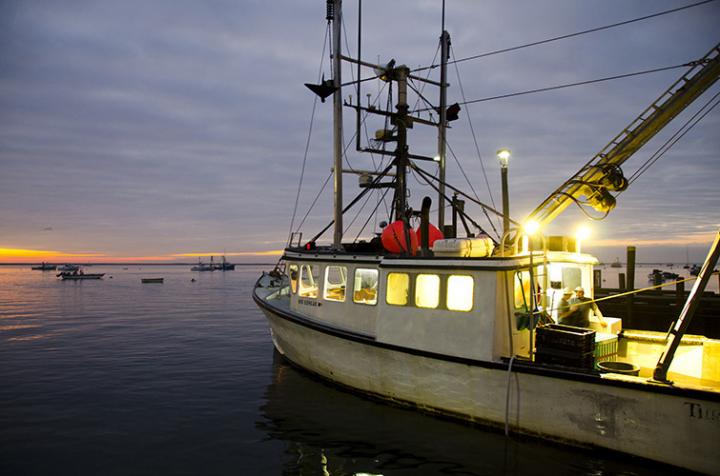Rutgers study shows resilience among fishermen facing market disruptions

Credit: NOAA Fisheries
With restaurants and supply chains disrupted due to the global coronavirus pandemic, two-fifths of commercial fishermen surveyed from Maine through North Carolina did not go fishing earlier this year, according to a Rutgers study that also documented their resilience and adaptation.
Of those who kept fishing, nearly all reported a decline in income compared with previous years, according to the survey of 258 fishers in the Northeast published in the journal PLOS ONE.
The study, which covers March to June, also examined data on fish landings and found that the catch for some species, such as squid and scallops, decreased compared with previous years. But the catch for other species, such as black sea bass and haddock, was on par with or higher than previous years, suggesting that many fishermen fished as much as they had been before the pandemic, while earning less income.
“They may have kept fishing to pay their bills or crew, or to maintain their livelihoods or their quotas until markets rebound,” said main author Sarah Lindley Smith, a post-doctoral associate in the Department of Human Ecology in the School of Environmental and Biological Sciences at Rutgers University-New Brunswick. “Most of the fishermen who stopped fishing during the early months of the pandemic planned to resume fishing instead of leaving the industry.”
The fishing industry has been slammed by the pandemic due to the loss of restaurant sales, disruptions in export markets and a decline in seafood prices. Before the pandemic, 70 percent of seafood spending in the United States took place in restaurants, the study notes. But restaurant sales were severely reduced or in some cases lost altogether during stay-at-home orders, when restaurants were closed or limited to take-out. Sales were slow to return as stay-at-home orders were lifted and restaurants remained closed or were limited to outdoor dining or serving at reduced capacity.
The supply chain also endured significant disruptions as a result of the loss of European and Asian export markets, as well as social distancing requirements in processing facilities, at seafood dealers, at retailers and in seafood transportation.
The survey found that fishermen adopted a number of strategies to adapt to the pandemic. Strategies include selling their catch directly to consumers, participating in residential delivery programs and community-supported fishery programs or switching the species of fish they target. Fishermen are often characterized as resilient, a view supported by the survey findings. Still, resilience comes at a significant cost in terms of earnings. And while fishermen have taken a big hit economically, that has not necessarily led to reduced pressure on fish stocks. As fisheries managers consider how to best support the fishing industry moving forward, the survey findings will help them understand the short-term impacts of the pandemic.
“While we found that many fishermen kept fishing in the short-term, it will be necessary to study the longer-term impacts of the pandemic on the industry to understand whether this trend will continue,” Smith said.
Additional research is ongoing to assess the repercussions of COVID-19 on fishing households, including impacts on well-being and mental health.
“The pandemic is just the latest threat for a sector coping with climatic pressures, overfishing, the legacies of oil spills and extreme events, and fishery management policies,” said co-author Victoria Ramenzoni, an assistant professor in the Department of Human Ecology. “It is important to isolate these responses to identify the true cost of adaptation.”
###
Rutgers co-authors include doctoral student Abigail Golden, Douglas R. Zemeckis of Rutgers Cooperative Extension of Atlantic County and former Professor Olaf P. Jensen, who is now at the University of Wisconsin-Madison. The survey is part of a NOAA-funded project, co-led by Ramenzoni and Jensen, to study the adaptation strategies of Northeast fishermen to climate change.
Media Contact
Todd Bates
[email protected]
Original Source
https:/
Related Journal Article
http://dx.




